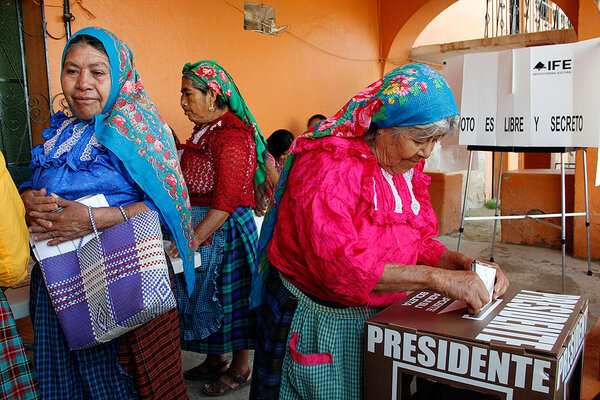In the indigenous community of Santa María Quiegolani in Oaxaca, Mexico, there are changes in the law to promote women in those communities to participate in politics. However, these changes actually spark opposition from these same women the changes aim to help. This gained national attention with Eufrosina Cruz Mendoza who broke out of traditional ways of her indigenous community by studying at high school and a university. She ran in her indigenous community for municipal president but did not succeed as municipal authorities believe she cheated her way through by not going through traditional routes of election. While she lost within her own community, she rose to attain several positions at the state and national level. In these positions, she sponsored a reform to the Mexican Constitution which “recognizes the autonomy of the indigenous communities and their right to self-government.” Eufrosina wants to reform this so that “under no circumstance would this right undermine the right of women to participate in politics.” However, this reform is challenging traditional customs of the indigenous people of Oaxaca.

Eufrosina Cruz. Photo courtesy of https://www.entrepreneur.com/article/288408
In Oaxaca, indigenous communities have autonomy to choose their own leaders. Many of the municipalities use usos y costumbres to select their authorities. In this system, people must do tequios, public service activities, in order to earn their right to participate in the government. There is no secret ballot and the system usually calls that people climb the ladder of positions. While women are able to vote and do hold municipal positions, only about 2% of municipalities had women as their municipal presidents. What stands in the way are several issues- the domestic chores of women and fear of government intervention. Zaira Hipólito López, a community psychologist says that it is a “double burden” for women; working for the community and taking care of domestic chores. Being part of the municipal does not pay like it does outside at the state and national level. Further, she says, when women’s husbands are elected, these women feel like they are participating “since they assume many of the men’s regular responsibilities.” Women have other fears, such as federal government intervention. This happens when municipal states do not follow federal guidelines or when there are internal conflicts. Some view this federal intervention as the government trying to take advantage of the communities’ resources. In addition, women feel the reform “violates their customs and their right of self-determination” and is “an imposition on their traditions”.

Women cast votes in Oaxaca, Mexico. Photo courtesy ofhttps://www.csmonitor.com/World/Americas/Latin-America-Monitor/2017/0106/Indigenous-women-in-politics-a-complex-proposition
This article uncovers some myths of the indigenous communities of Latin America, specifically in Mexico. For example, the news article recognizes that many people do not think that women are able to participate at all in the government. However, this is untrue. In most municipalities, women are able to vote and only 18% ban women from voting which the news article recognizes “is still too high, but the myth that all indigenous communities repress women’s right to vote is just that, a myth; 343 municipalities did allow them to have an electoral voice.” The author of this news story interviewed people from the indigenous community and took into perspective how the indigenous communities view “Western” ways. These views are not always transferable. They fear corruption and believe that well intentioned Western ideas can infringe on their rights as indigenous communities. [1]
In the context of class themes, this deals with indigenous people and their traditions. Many people continue to live in traditional ways and want to continue to do so- without outside influence. In general, people outside of these communities are often quick to make assumptions about their “backwardness” for keeping their traditional ways and not taking on Western ways. It does draw a fine line between wanting to help Indigenous people versus disrupting their traditions and culture. Questions arise about gender and gender roles. Do these women see themselves as oppressed or do they view this as a natural way of life? Should assumptions be made that gender roles everywhere be eradicated? Pertaining to this news article, it puts into perspective relations with the indigenous communities and brings to attention the issue of helping the indigenous people versus obstructing their traditions and cultures.
[1] Hoffay, Mercedes, “Indigenous women in politics: a complex proposition,” The Christian Science Monitor, January 6, 2017, https://www.csmonitor.com/World/Americas/Latin-America-Monitor/2017/0106/Indigenous-women-in-politics-a-complex-proposition.
Links to other articles that relate to this news article:
Article on Eufrosina Cruz from a different perspective: https://www.entrepreneur.com/article/288408
Article on 2001 Mexico Constitution reform: http://www.scielo.org.mx/scielo.php?script=sci_arttext&pid=S1870-05782012000100002
